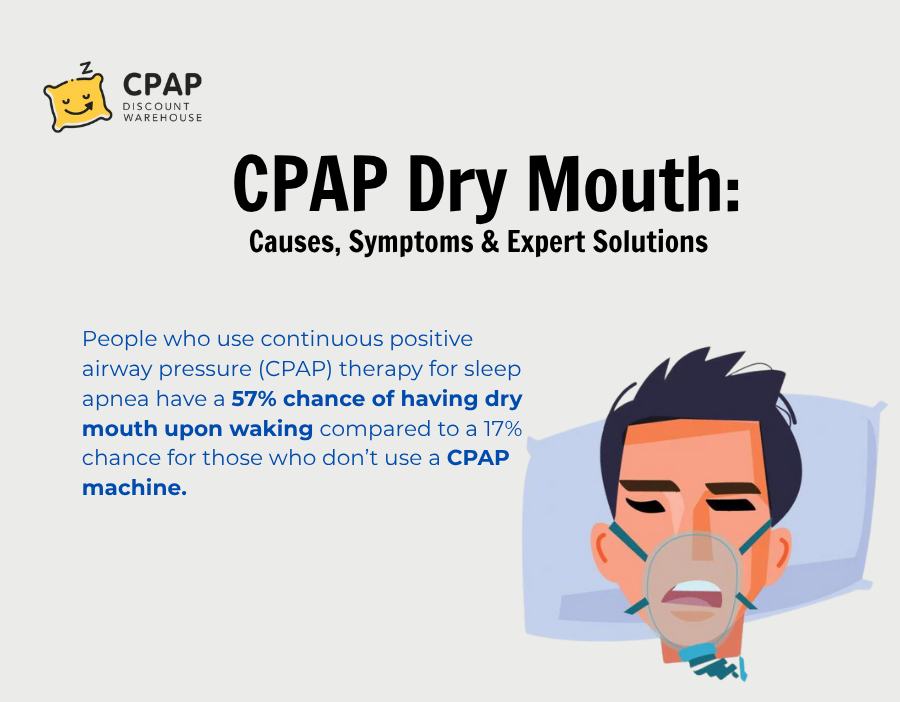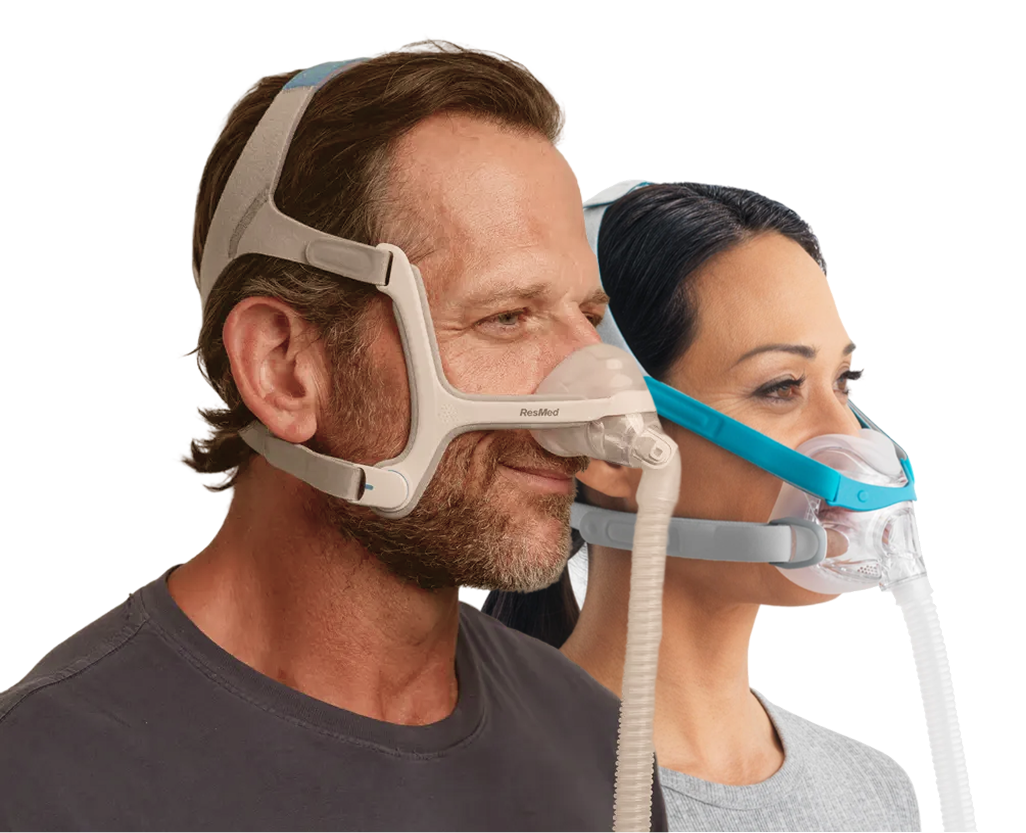CPAP dry mouth is a common side effect that is often overlooked. The CPAP machine has had a profoundly life-changing impact on people with sleep apnea by maintaining an open airway and enabling them to achieve quality sleep; however, it can also cause discomfort if not optimized properly. Waking up with a dry, sticky mouth may seem minor at first, but unaddressed will affect your comfort, oral health, and long-term therapy adherence. In this guide from CPAP Discount Warehouse, we’ll explore what causes dry mouth during CPAP use, how it affects your health, and most importantly.
Why is my mouth so dry using CPAP?
The main cause of CPAP dry mouth is the steady flow of pressurized, dehumidified air, which can bypass the nose and throat, your body’s natural humidifiers, leaving your mouth dry. So, does CPAP cause dry mouth? Absolutely, and several factors play a role:
-
Anatomical factors: Some individuals naturally produce less saliva, making them more susceptible to dry mouth. Additionally, nasal congestion caused by allergies, colds, or structural issues (like a deviated septum) can force mouth breathing, which significantly worsens dryness when using CPAP machine.
-
Physiological factors: Medications such as antihistamines, decongestants, or antidepressants can decrease saliva production. Dehydration, especially if you don’t drink enough water during the day, also contributes to an overall dry mouth.
-
Environmental factors: Dry bedroom conditions can amplify CPAP-related dryness. In regions like Adelaide, where the air can be particularly arid, low ambient humidity or air from fans and air conditioning may strip moisture from the air you breathe.
What causes dry mouth while sleeping with CPAP?
In addition to the dry air flow itself, several CPAP-related issues and habits can directly trigger or worsen dry mouth symptoms:
-
Mouth breathing: If you use a nasal mask or nasal pillows and tend to breathe through your mouth while sleeping, the air escapes and leaves your mouth dry.
-
Poor mask fit: A CPAP mask that’s too loose or improperly sized can leak air, reducing therapy effectiveness and directing dry air toward your mouth.
-
Insufficient humidification: If your CPAP humidifier is turned off, set too low, or not filled properly, the air delivered will lack moisture, making dry mouth more likely.
-
Medication side effects: Even outside of CPAP use, medications that reduce saliva flow can exacerbate dry mouth during therapy. When combined with CPAP airflow, the drying effect can become more pronounced.

Symptoms and Oral Health Impacts
CPAP Dry Mouth and Throat extends beyond simple discomfort. This is some common symptoms:
-
Waking up with a dry, sticky mouth or throat.
-
Difficulty speaking, swallowing, or tasting.
-
Cracked or chapped lips.
-
Bad breath (halitosis).
-
Sore throat or hoarseness.
-
Burning or tingling sensation in the mouth.
Persistent dryness, also known as xerostomia, can lead to a range of unpleasant symptoms and serious oral health issues:
-
Tooth Decay: Saliva helps wash away food particles and neutralize harmful acids. A dry mouth allows bacteria to build up, increasing the risk of cavities and enamel erosion.
-
Gum Disease: Dry conditions can promote bacterial overgrowth along the gum line, leading to inflammation, bleeding gums, and even tooth loss if not treated.
-
Oral Infections: Without adequate saliva, your risk of developing fungal infections, like oral thrush, significantly increases.
-
Denture Discomfort: For those who wear dentures, a dry mouth can reduce suction and moisture, making dentures unstable and irritating the gums.
How to Prevent and Treat CPAP Dry Mouth?
Addressing CPAP dry mouth often involves a multi-pronged approach, combining equipment adjustments, behavioural changes, and targeted remedies.
Selecting the right mask
-
Nasal Pillows and Nasal Masks: If you're a mouth breather, using these mask types without a chin strap or mouth tape will almost certainly lead to dry mouth.
-
Full-Face Masks: These masks cover both your nose and mouth, making them ideal for mouth breathers as they prevent air leakage through the mouth.
-
Chin Straps: For those who prefer nasal masks or pillows but tend to open their mouth during sleep, a chin strap can effectively keep the mouth closed, promoting nasal breathing.
-
Mouth Taping/Strips: As an alternative to chin straps, specific CPAP-safe mouth strips can help keep the mouth sealed overnight.
Behavioural changes and optimizing your equipment
To reduce dry mouth with CPAP therapy, optimizing your equipment and habits is essential.
-
Humidification: Most modern CPAP machines include a heated humidifier that adds moisture to the airflow. Make sure the chamber is filled daily. If dryness persists, your humidifier settings may need adjusting, or the unit might not be working properly.
-
Add Heated Tubing: Heated tubing maintains consistent air temperature from the machine to your mask, preventing condensation and ensuring steady humidity.
-
Stay Hydrated: Drink water regularly, especially before bed.
-
Avoid Alcohol & Caffeine: These dry out your system.
-
Treat Nasal Issues: Use saline sprays or consult a doctor if congestion is frequent.
-
Maintain Oral Hygiene: Brush and floss daily to protect against dry mouth effects.
How to optimise settings on ResMed machines?
-
Auto Mode (e.g., ClimateLineAir): Start with the default setting around 27°C. The system auto-adjusts based on room conditions.
-
Manual Mode: Begin with a humidity level of 3 (scale 1–8) and tube temp around 27°C (81°F).
-
If still dry: Increase humidity and temperature slightly.
-
If rainout occurs, lower the humidity or raise the tube temperature.

How clinicians can help prevent dry mouth from CPAP use?
The following best practices outline what healthcare professionals can do to minimize dryness and improve comfort with CPAP therapy.
-
Assess the Patient Thoroughly: Review breathing style, medications, and health conditions that may contribute to dry mouth.
-
Fit the Right Mask: Recommend the most suitable mask and ensure a proper fit. Teach patients how to detect and fix leaks.
-
Educate on Humidification: Explain how to use heated humidifiers and tubing effectively, especially when dryness persists.
-
Suggest Chin Straps or Mouth Taping: For mouth breathers with nasal masks.
-
Refer as Needed: ENT referrals for nasal issues; dentists for oral health concerns.
-
Schedule Follow-Ups: Monitor comfort, adherence, and symptoms; adjust settings if necessary.
Consistent support and proper setup can significantly reduce CPAP-related dry mouth.
Remedies and CPAP dry mouth solutions
In addition to adjusting your CPAP machine and daily habits, various products can help relieve CPAP-related dry mouth. Here are the key solutions:
+ CPAP dry mouth tablets
+ CPAP dry mouth spray
+ Xylitol Products
+ Hydration
+ Room Humidifiers
+ Nasal Saline Sprays
Combining these remedies with proper CPAP use, mask fit, and good hydration can significantly ease dry mouth symptoms. Always consult your doctor How to treat dry mouth from CPAP?
|
Feature |
CPAP Dry Mouth Tablets/Lozenges |
CPAP Dry Mouth Sprays |
CPAP Machine Humidifiers |
|
Mechanism |
Stimulate saliva / add moisture |
Topical moisture |
Add humidity to the CPAP airflow |
|
Primary Benefit |
Long-lasting relief, dental protection |
Fast, temporary relief |
Prevents dryness at the source |
|
Application |
Dissolve slowly in the mouth |
Spray directly into the mouth |
Integrated into the CPAP machine |
|
Duration |
Varies |
Short-acting, may need reapplication |
Continuous during CPAP use |
|
Cost |
Low |
Low |
Varies |
|
Pros |
Convenient, dental-friendly |
Easy to carry, immediate relief |
Most effective long-term solution |
|
Cons |
May not work alone in severe cases |
Temporary effects only |
Requires setup, maintenance, and distilled water |
|
Best Used With |
Humidification and hydration strategies |
Other relief products or in emergencies |
Core solution for all CPAP users |
>>>> How to stop cpap mask from leaking? 6 Common issues
FAQs
Why do I get dry mouth with my CPAP machine?
You primarily get dry mouth because the continuous flow of pressurized air from the CPAP machine can dry out your mouth and nasal passages, especially if you breathe through your mouth or if your mask has leaks. Insufficient humidification from the CPAP device also contributes significantly, often leading to CPAP dry mouth even with a humidifier if settings aren't optimal.
What is the best CPAP dry mouth spray?
There isn't a single "best" CPAP dry mouth spray, as effectiveness can vary by individual. Look for sprays specifically designed for dry mouth that contain ingredients like xylitol, hyaluronic acid, or carboxymethylcellulose, which help to lubricate and moisturize the oral tissues. Consult your pharmacist or sleep specialist for recommendations.
Can CPAP dry mouth lead to tooth decay?
Yes, persistent CPAP dry mouth can significantly increase your risk of tooth decay (cavities) and gum disease. Saliva is vital for neutralizing acids, washing away food particles, and protecting tooth enamel. When saliva production is reduced, bacteria can thrive, leading to dental problems, hence the concern about CPAP dry mouth tooth decay.
Conclusion
CPAP dry mouth is a common but manageable issue for sleep apnea patients in Adelaide and beyond. It often results from poor mask fit, low humidity, or mouth breathing. To reduce discomfort, ensure your mask fits well, optimise humidifier settings, and stay hydrated. Use xylitol-based products to support oral health and prevent tooth decay. If CPAP dry mouth even with humidifier, check your setup and speak with your clinician. Regular reviews with your sleep specialist and dentist can help fine-tune your treatment, improve comfort, and support long-term CPAP therapy success.






